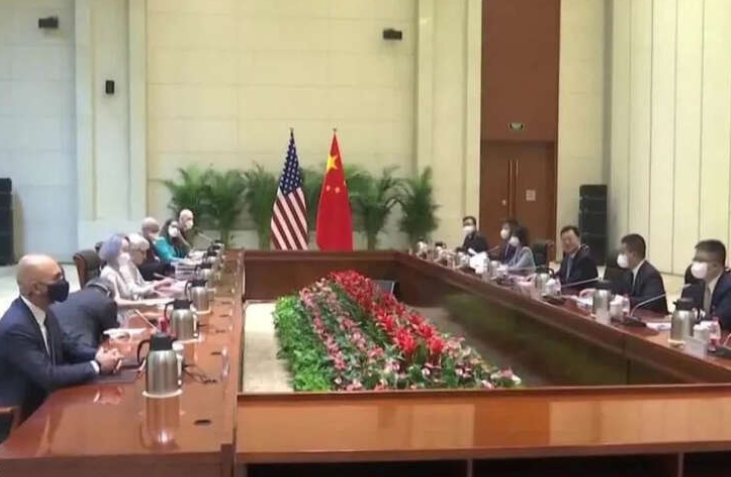
In rare high-level talks on July 26, Chinese and American officials laid out each of their grievances in the northern Chinese city of Tianjin but agreed on the need to keep talking.
U.S. Deputy Secretary of State Wendy Sherman visited China a week ago, during which she held an extensive conversation with Vice Foreign Minister Xie Feng, and met with Foreign Minister and State Councilor Wang Yi.
The exchanges were – as expected – contentious, fraught with disagreements, and ideologically driven. The White House noted that Sherman’s visit had sought to “advance U.S. interests and values, and to responsibly manage the relationship”; Beijing, on the other hand, observed that bilateral relations were stuck in a “stalemate”, and required American adherence to Chinese “red lines” in order to unthaw relations. While no substantive concessions or agreements were reached, the visit connoted a welcome break from the escalating spite between the two largest national economies in the world.
Yet Sherman’s visit was not without controversy – from both sides of the Pacific. Plenty of feathers were ruffled by the perception among some in Washington D.C., that Beijing had failed to reciprocate Sherman’s visit with due, cordial respect. The allegation was that in arranging for Xie Feng (Vice Minister in charge of North America and Oceania) to meet with Sherman, as opposed to Le Yucheng (Vice Minister in charge of executive/daily affairs at the Office), Beijing was implicitly snubbing Sherman by refusing to set up a dialogue between her and her “counterpart.” Indeed, even a prominent commentary dubbed China as snubbing the senior U.S. official amidst the worsening diplomatic stand-off.
Much of this, as it later emerged, was largely a storm in a teacup. A fundamental misunderstanding undergirded the controversy – while Le Yucheng is substantively in charge of managing the office at large, Xie Feng remains the specific point-man for China on affairs pertaining to the U.S.-China relationship. Additionally, Sherman was also due to be received by Wang Yi, China’s Foreign Minister and a State Councilor (which places him among the national leadership). To cast the Chinese response and personnel arrangements as “disrespectful” reflects a fundamental misunderstanding of both seniority and functionalist portfolio assignments within the Foreign Ministry.
There are of course residual doubts concerning whether Wang – or, indeed, the Politburo member in charge of foreign affairs – Yang Jiechi, belonged to the “inner circles” of President Xi. Such speculative judgments, however, should best be left out of formal, government-to-government exchanges, where the maintenance of etiquette and formal protocol in line with established positions and profiles should be weighed as of particular importance.
This is not to say, however, that an exclusive and excessive focus on official standing would do bilateral relations much good. There exists a danger in what I shall term the “Naming Syndrome” in international relations – i.e. this fixation over titles, status, and conversing with exclusively counterparts of “equivalent rank.” America is by no means the only party susceptible to this syndrome, as leading diplomats, politicians, and statespersons from China and the European Union alike, find themselves embroiled in contention over whether particular actors from the other party had the remit and “standing” to comment on their own “internal affairs.” Over the past decade or so, Chinese diplomats have not only been wary that the country’s sovereignty has been actively undermined by foreign criticisms and consternation, but also that its administrative apparatus and government were actively “disrespected” by those who refused to engage with it on reciprocal terms of broad parity.
Such fixation is dangerous, for it actively brews misunderstandings and exacerbates communicative differences. It is undeniably true that it would be ludicrous to pair a Foreign Minister of a state with an attache of another nation. Yet when it comes to working meetings, as well as meetings in which specific issues and topics are debated, it is imperative that leniency and benefit of doubt are both afforded to the other side. Decorum and etiquette matter, but so does speaking to the most fitting and hands-on-involved counterparts of the other party, especially when relations are terse and already proliferate with substantial misgivings. The obsession with status hierarchy could lead to hostile intentions being read into statements and decisions where there in fact is none, thereby thwarting any attempts at genuine reconciliation and dialogue. Diplomats bear the distinctive responsibilities of ameliorating tensions, as opposed to excavating dirt on the other side and amplifying differences through propagation of misperceptions. This applies not just to large nation-states like the U.S. and China, but also smaller nations and non-state actors involved in formal diplomacy.
Furthermore, the importance of proper protocol does not warrant fastidiousness over it. Some of the most fruitful and elucidating conversations in international politics are often held behind closed doors – at civil, robust, and candid exchanges in conferences, over the dinner table at symposia and fora, or through existing friendships and interpersonal relationships. Track-II diplomacy, in particular, behooves those involved to be willing to set aside formalities and rigidities, for the sake of facilitating and engaging in maximally productive exchanges. While Sherman’s visit to China was, by definition, a track-I dialogue, the broader contentions surrounding it have rendered it more difficult for civilians and civil society actors to get through to formal members of their counterparts’ administrations. The worry isn’t just that track-I dialogues would become enmeshed in vacuous squabbles, but that the posturing and disgruntlement would spill over into the track-II space, thereby stifling valuable discussions and debates between state officials and civilians, academics, and policy analysts.
All in all, what’s in a name? At times like these, it is all the more important that we keep communication channels as plural, as open, and as bilaterally reciprocated as possible. Both China and the United States alike would benefit from parking away questions over “face” (mianzi), and grappling with the divergences between the two, which are very much real, pressing, and deeply worrying.